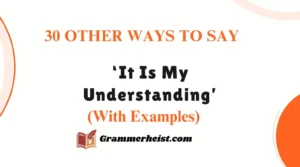In professional and casual conversations, “It is my understanding” often pops up when you want to express what you believe or perceive about a situation. But using the same phrase repeatedly can make your speech or writing sound monotonous.
Looking for fresh alternatives? You’re in the right place! In this article, we’ll explore 30 ways to say “It is my understanding”, complete with examples. 30 Other Ways to Say ‘It Is My Understanding’ (With Examples) Whether you’re drafting an email, writing a report, or having a discussion, these variations will add depth and professionalism to your communication.

Why Use Alternatives to “It Is My Understanding”?
Before we dive into the list, let’s talk about why finding alternatives matters:
-
Enhances clarity and tone: Different phrases can better suit formal, casual, or technical contexts.
-
Prevents repetition: Using varied language keeps readers and listeners engaged.
-
Demonstrates language proficiency: A richer vocabulary can leave a stronger impression on your audience.
Pro Tip: Always tailor your language to your audience and the context for maximum impact.
30 Alternatives to “It Is My Understanding” (With Examples)
1. I believe
Example: I believe the meeting is scheduled for 2 PM.
2. I gather
Example: I gather the client was satisfied with the proposal.
3. From what I know
Example: From what I know, the project is on track.
4. It appears that
Example: It appears that the system update has been successful.
5. It seems to me
Example: It seems to me that we should reconsider our strategy.
6. As far as I know
Example: As far as I know, no further action is needed.
7. If I’m not mistaken
Example: If I’m not mistaken, we submitted the forms last week.
8. I presume
Example: I presume you have received the final draft.
9. I assume
Example: I assume the data has been validated.
10. It is apparent that
Example: It is apparent that customer satisfaction has improved.
11. It strikes me that
Example: It strikes me that we could streamline the process further.
12. I am under the impression
Example: I am under the impression that the deadline has been extended.
13. It is clear to me
Example: It is clear to me that we must act swiftly.
14. I interpret that
Example: I interpret that the feedback was generally positive.
15. To my knowledge
Example: To my knowledge, all contracts have been signed.
16. My understanding is that
Example: My understanding is that training sessions are mandatory.
17. It would seem
Example: It would seem that the server is down.
18. Evidently
Example: Evidently, the issue has been resolved.
19. Apparently
Example: Apparently, the supplier will deliver ahead of schedule.
20. Based on what I’ve heard
Example: Based on what I’ve heard, the budget has been approved.
21. From my perspective
Example: From my perspective, we should invest more in marketing.
22. From what I understand
Example: From what I understand, the CEO supports the initiative.
23. I take it that
Example: I take it that everyone is aligned with the plan.
24. My impression is that
Example: My impression is that sales are improving steadily.
25. I would say
Example: I would say this approach is the most effective.
26. I have reason to believe
Example: I have reason to believe that the market is shifting.
27. As I see it
Example: As I see it, we have two viable options.
28. In my view
Example: In my view, the merger offers great opportunities.
29. To the best of my knowledge
Example: To the best of my knowledge, all requirements are met.
30. I’m convinced that
Example: I’m convinced that we’re on the right path.
Tips for Choosing the Right Alternative
When selecting the best phrase to replace “It is my understanding,” consider:
-
Formality: For business or academic settings, phrases like “I have reason to believe” or “To the best of my knowledge” may sound more professional.
-
Certainty: Phrases like “I presume” or “Apparently” imply less certainty, while “I’m convinced that” conveys strong confidence.
-
Tone: If you want a softer tone, go for “From what I gather” or “It seems to me.”
-
Audience: Use straightforward alternatives like “I believe” for general audiences and nuanced ones for experts or stakeholders.
Common Mistakes to Avoid
While using alternatives adds flavor to your writing or speech, avoid these pitfalls: 30 Other Ways to Say ‘It Is My Understanding’ (With Examples)
-
Overcomplicating: Sometimes, simple is better. Don’t overuse fancy expressions if clarity suffers.
-
Using uncertain phrases for firm facts: If something is verified, don’t say “apparently”—state it confidently.
-
Inconsistency: Match your language style throughout a piece of writing or conversation.
Related reading: How to Write Professional Emails Without Sounding Robotic
Why Language Variety Matters for Professional Communication
A diverse vocabulary demonstrates critical thinking and communication skills. 30 Other Ways to Say ‘It Is My Understanding’ (With Examples)—qualities highly valued in business, education, and leadership roles.
Mastering subtle differences in phrasing can help you:
-
Build credibility
-
Foster a clearer understanding
-
Adapt to different communication styles
If you’re serious about refining your professional communication, learning to vary your expressions is a small but impactful step. 30 Other Ways to Say ‘It Is My Understanding’ (With Examples)
Explore more: Top 50 Professional Email Phrases You Should Know
Conclusion
Using different ways to say “It is my understanding” can greatly enhance your communication. Whether you’re trying to sound more polished, clear, or diplomatic, having a range of options empowers you to adjust your language to fit any situation.
Next time you’re writing an important email or participating in a key meeting, try out some of these alternatives—you’ll notice the difference! 30 Other Ways to Say ‘It Is My Understanding’ (With Examples)
